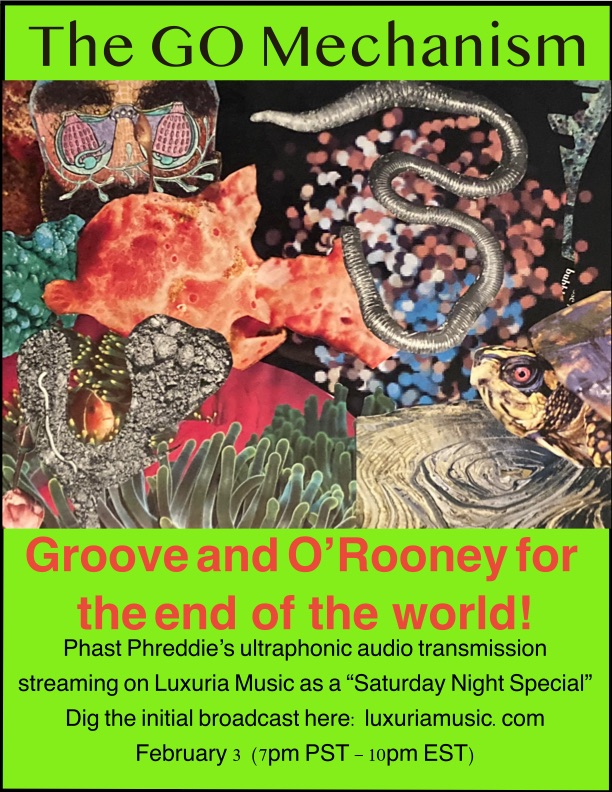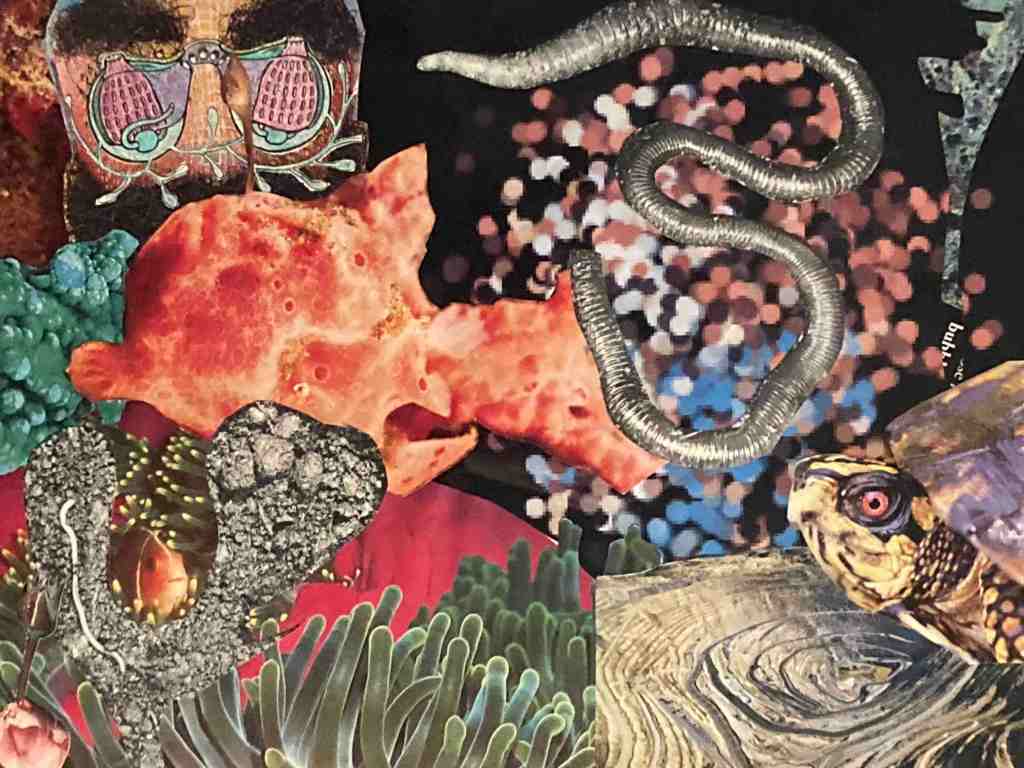
This is The GO Mechanism—an audio Odyssey scientifically engineered and programed in the secret laboratory of Boogaloo Omnibus Productions by your host, Phast Phreddie. The GO incorporates copyrighted ultra-phonic techniques not available to other broadcast entities. The “G” stands for GROOVE and there is plenty of GROOVE in every GO Mechanism. The “O” stands for O’ROONY, an intricate and complex impulse that is incomprehensible to those who possess standard-issue precepts. Listen and you will hear.
The GO Mechanism is first aired on the Luxuria Music web streaming hustle as a Saturday Night Special—this one to be aired on February 3. It will then be available as a podcast on the Luxuria Music website for a few weeks before being posted in the Mixclouds and down below here in the Boogaloo Bag.
In order to achieve total comprehension of The GO Mechanism, it is strongly recommended that this post be referenced while listening to the corresponding program—GO Mechanism Number Twenty.
At the beginning of the second hour The GO presents The Science Corner, a portion of the show where a subject of musical importance is discussed and several records are played to illustrate it. This one will feature Barbara Lynn.
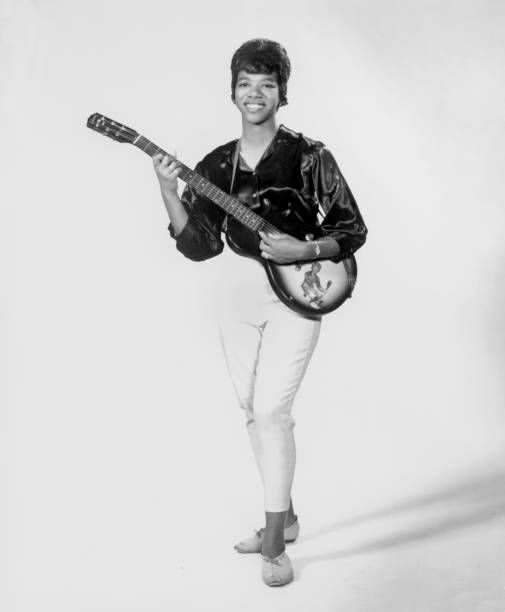
Barbara Lynn Ozen was born in 1942 in Beaumont, a small city in Texas near the south-east border with Louisiana. She became musically inclined as a young girl, learning to play the piano, then later the guitar, which she plays left-handed. She started a band called Bobby Lynn and Her Idols that played in clubs in the area, including nearby Houston and Lafayette, Louisiana. She came to the attention of the record producer Huey Meaux, who worked with talent around the Texas/Louisiana region. Meaux, known as The Crazy Cajun, liked a song Ms. Lynn wrote called “You’ll Lose a Good Thing.” He took Lynn to New Orleans where the song was recorded with New Orleans musicians and was able to sell it to Jamie Records. The song became a Number One R&B hit in the summer of 1962 and even broke into the Pop Top Ten. This success allowed her to tour the country and appear on American Bandstand a couple of times. Follow-up singles did not result in the same success, but they are mostly great records. One song, “Oh! Baby (We Got a Good Thing Going,” didn’t even crack the Top Forty R&B chart but was recorded by The Rolling Stones and appears on one of their early albums. Jamie Records must have had high hopes for Barbara Lynn, as the company released fifteen singles and an album by her, but further success did not come. She recorded for Meaux’s Tribe label, then Meaux licensed some tracks to Atlantic Records; enough for an album and a handful of singles. Three of those tracks are presented in The Science Corner: “This Is the Thanks I Get,” “You’re Losing Me” and “Until Then I’ll Suffer.”
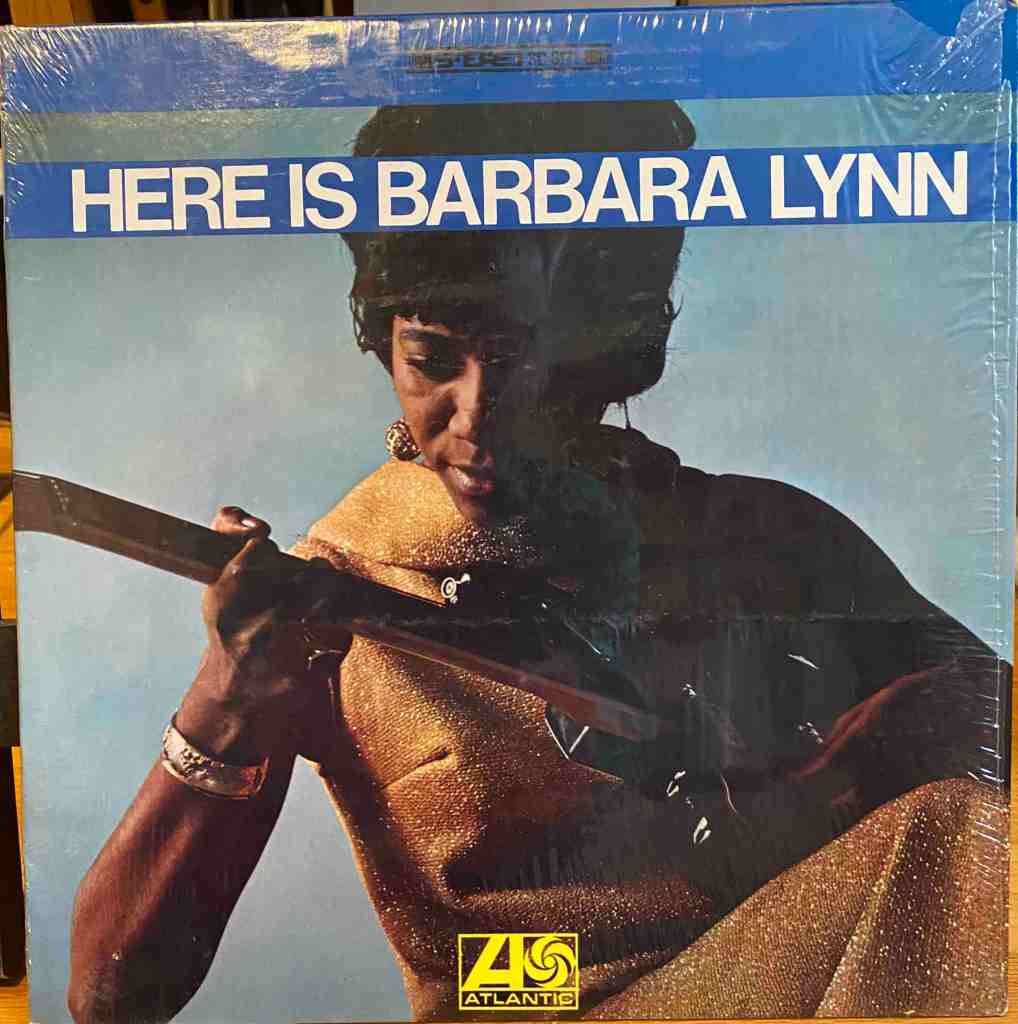
Her appearance on The !!!! Beat show—a variety TV program filmed in Dallas that featured many of the top R&B artists of the period, 1966—is especially inspiring, as she plays what may be called a rhythm guitar solo.
During the mid seventies and early eighties, Ms. Lynn set her career aside to raise her children, but began performing again by the mid eighties. Her recordings for Bullseye (1994) and Antones (2000) are worth seeking out. Barbara Lynn is still alive and performing. The GO Mechanism producers have witnessed her shows on several occasions and can attest to the fabulousness of Miss Barbara Lynn.
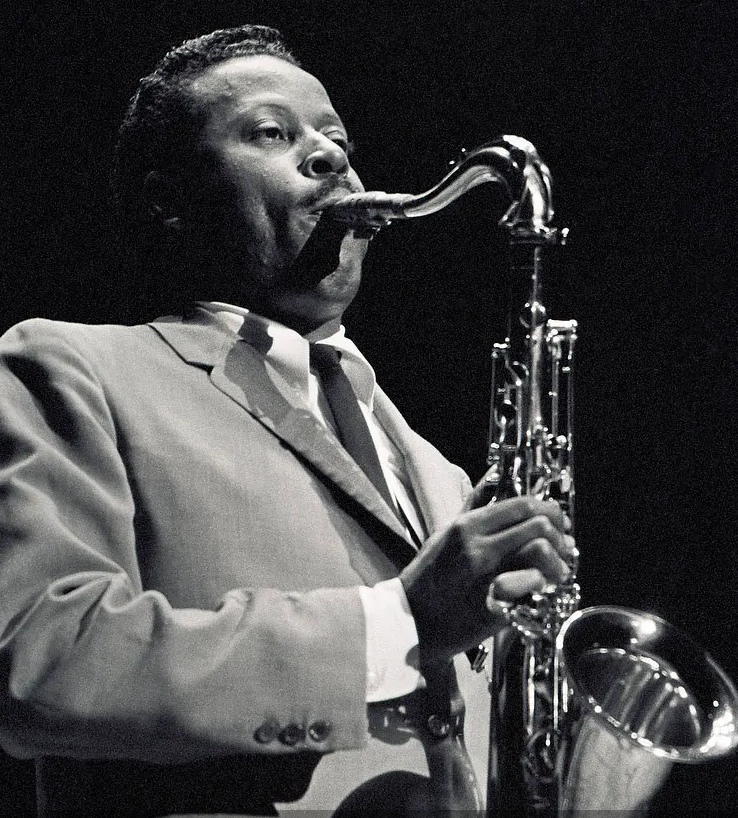
Eddie Davis—dubbed Eddie “Lockjaw” Davis sometime after this recording—was a fabulous tenor saxophonist whose extroverted style lent itself well to rhythm & blues records of the forties and early fifties. However, early in his career Mr. Davis travelled with the beboppers, as is witnessed by this recording, “Hollerin’ and Screamin’.” The trumpet player is the great Fats Navarro, a bebop legend. The pianist on this recording is Al Haig, who worked with Charlie Parker and appears on Miles Davis’ Birth of the Cool recordings. Bebop purists don’t seem to appreciate Davis’ solos on the two sessions he cut for Savoy Records. It seems the only reason they’ve been reissued is because Fats Navarro is on them. But The GO Mechanism producers dig Lockjaw’s sound. His tough, blues-drenched tone is exciting on this record and we look at the recording as an early fusion of modern jazz and rhythm & blues. Fats Navarro died of tuberculosis in 1950. Eddie Davis had a long career. He started it in the big bands of Cootie Williams and Andy Kirk; worked with other beboppers, including Miles Davis and Sonny Stitt; was an early practitioner of the sax/organ jazz combo—mostly with Shirley Scott; and made well-regarded records with the saxophonist Johnny Griffin. Late in his career he returned to the big band scene when he worked with the Count Basie Orchestra. Davis died of Hodgkin’s lymphoma in 1986 at the age of 64.
The Strawberry Alarm Clock’s “The World’s on Fire” has a very cool bass riff and a super boss groove. The GO Mechanism producers thought that the vocal detracts from the riff so they cut that part out! This is a GO Mechanism exclusive edit. The Strawberry Alarm Clock perform an even more severe edit of the song in the movie Psyche-Out, with groovy hippy dancing people and Jack Nicholson (!!) on guitar.
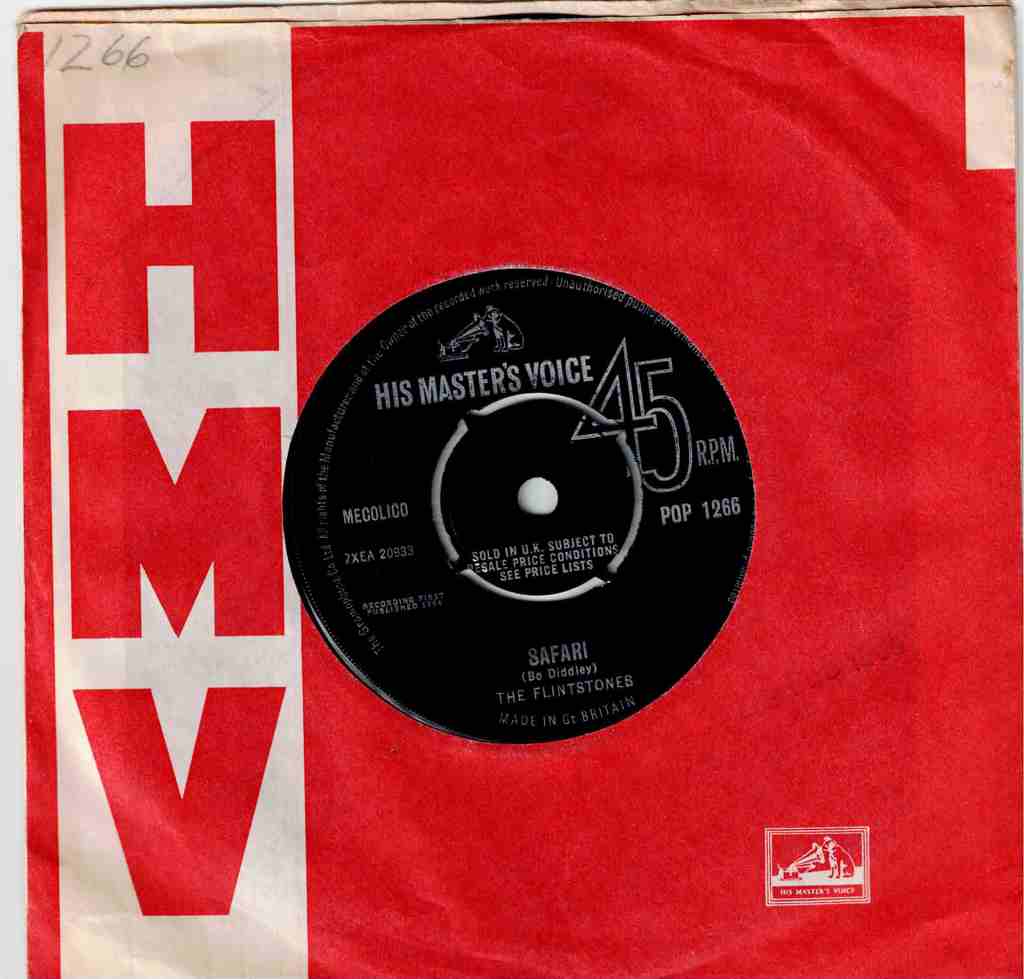
The Flintstones were a fledgling British beat group who, in 1962, cut an instrumental with producer Joe Meek. Meek released the record as by The Stonehenge Men. The next year, The Flintstones were the opening act and backing band for a UK tour headlined by The Everly Brothers. Also on the bill was Little Richard, Bo Diddley, The Rolling Stones, Mickey Most (an aspiring teen idol a few years before he became a successful record producer) and pop singer Julie Grant. The Flintstones backed The Everly Brothers, Little Richard and most likely Mickey Most and Julie Grant, too. Bo Diddley’s act was augmented by the presence of his guitarist The Duchess (Norma-Jean Wofford) and maraca player Jerome Green. Apparently, Bo Diddley took The Flintstones under his wing and wrote this instrumental, “Safari,” for them. The Flintstones also made friends with The Everly Brothers. Flintstones guitarist Terry Slater moved to Los Angeles to play in The Everly’s band and he wrote some songs that they recorded, including “Bowling Green” and “Lord of the Manner.” Slater became a record producer but eventually moved back to London where he was a music executive.
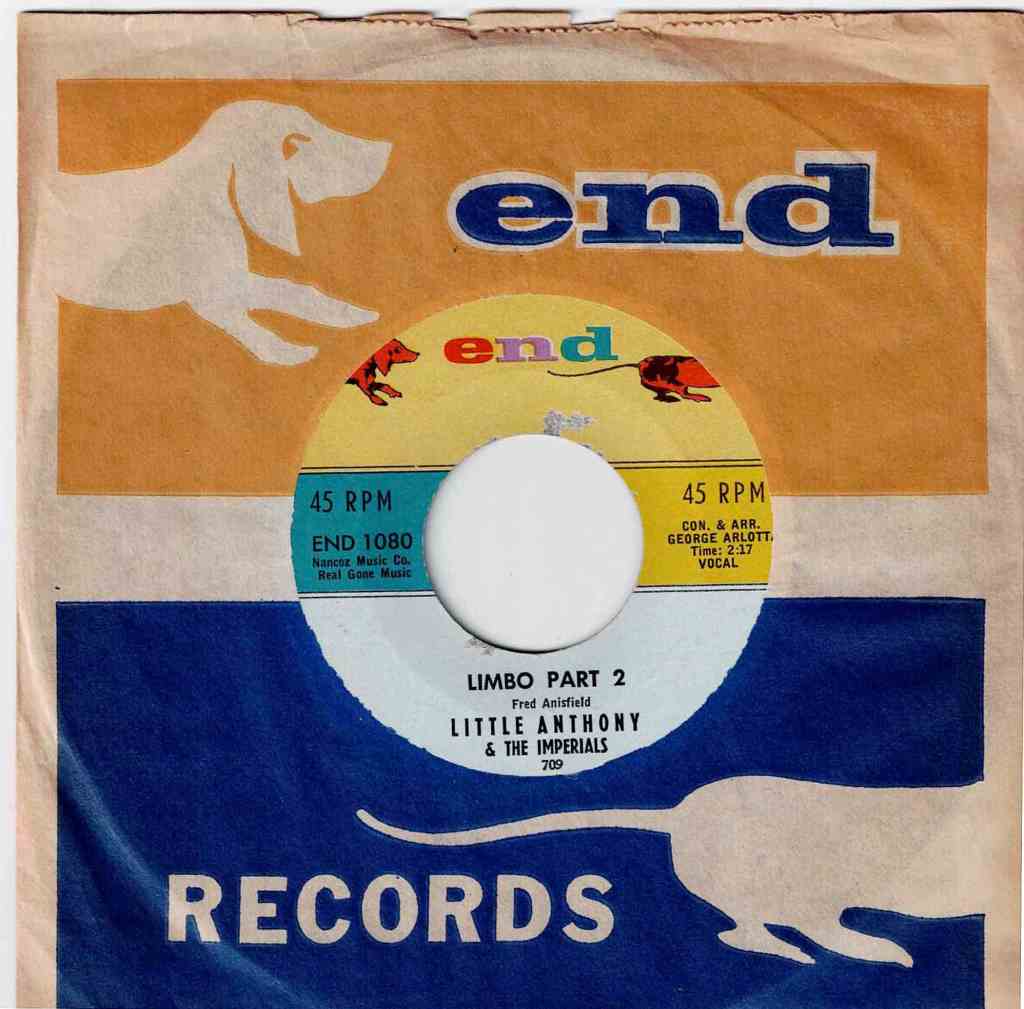
Part One of Little Anthony & the Imperials’ “Limbo” is basically a limbo-rock song, but a cool one. Part Two, as played in The GO, is a little more manic, with The Imperials coxing Little Anthony to go “down, Tony, down” over and over as Anthony screams out ad-libs while the wild limbo rhythms play out. It’s pretty boss and you may not hear this record anywhere else!
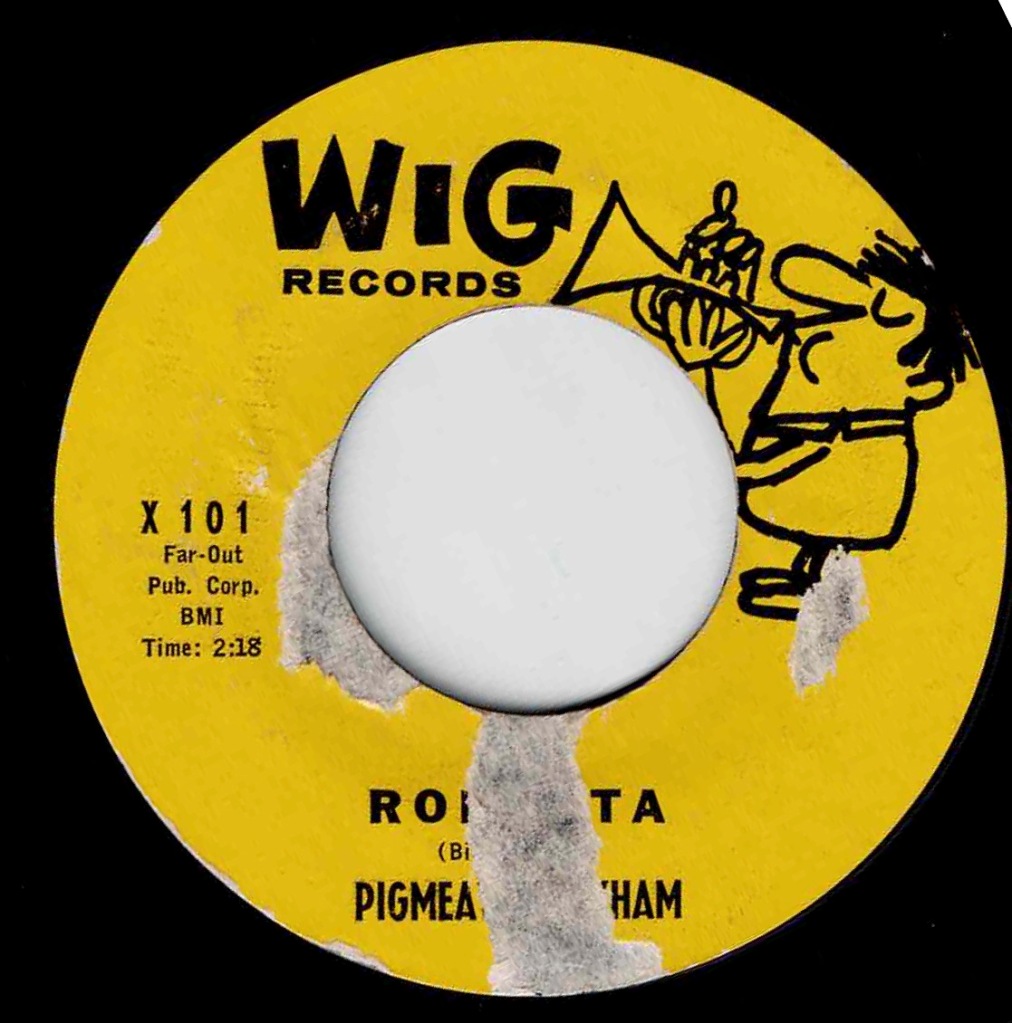
Pigmeat Markham was a comedian who had a surprise hit in 1968 with his catch phrase, “Here Comes the Judge.” He was a comedian who worked in vaudeville, performed in major concert houses, acted in movies and appeared on television. He cut some blues records for Blue Note—covers of songs by Ma Rainy and Leroy Carr—in 1946. During the sixties he cut a string of comedy albums that were released on Chess Records—a label known for blues, jazz, R&B and soul records. His “Here Come the Judge” routine was set to a funky beat and became a popular record; it is often noted as a precursor to rap music. Probably about ten years before that, he cut some jump blues records: “Let’s Have Some Heat”/“Your Wires Have Been Tapped” for the Cosmopolitan label and “(Wanted-Wanted-Wanted) A Healthy Baboon” for Wig Records. The flip side of “Baboon” is “Roberta,” heard here in The GO Mechanism.
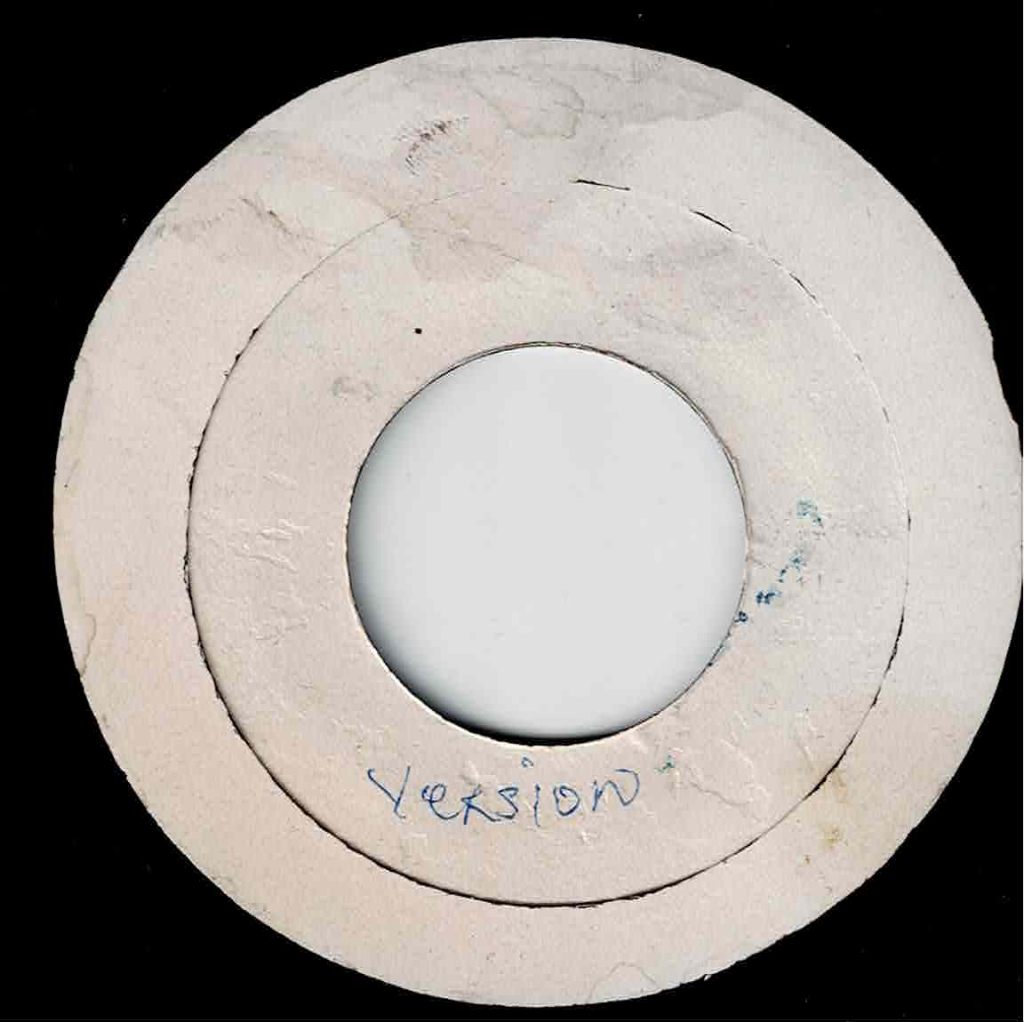
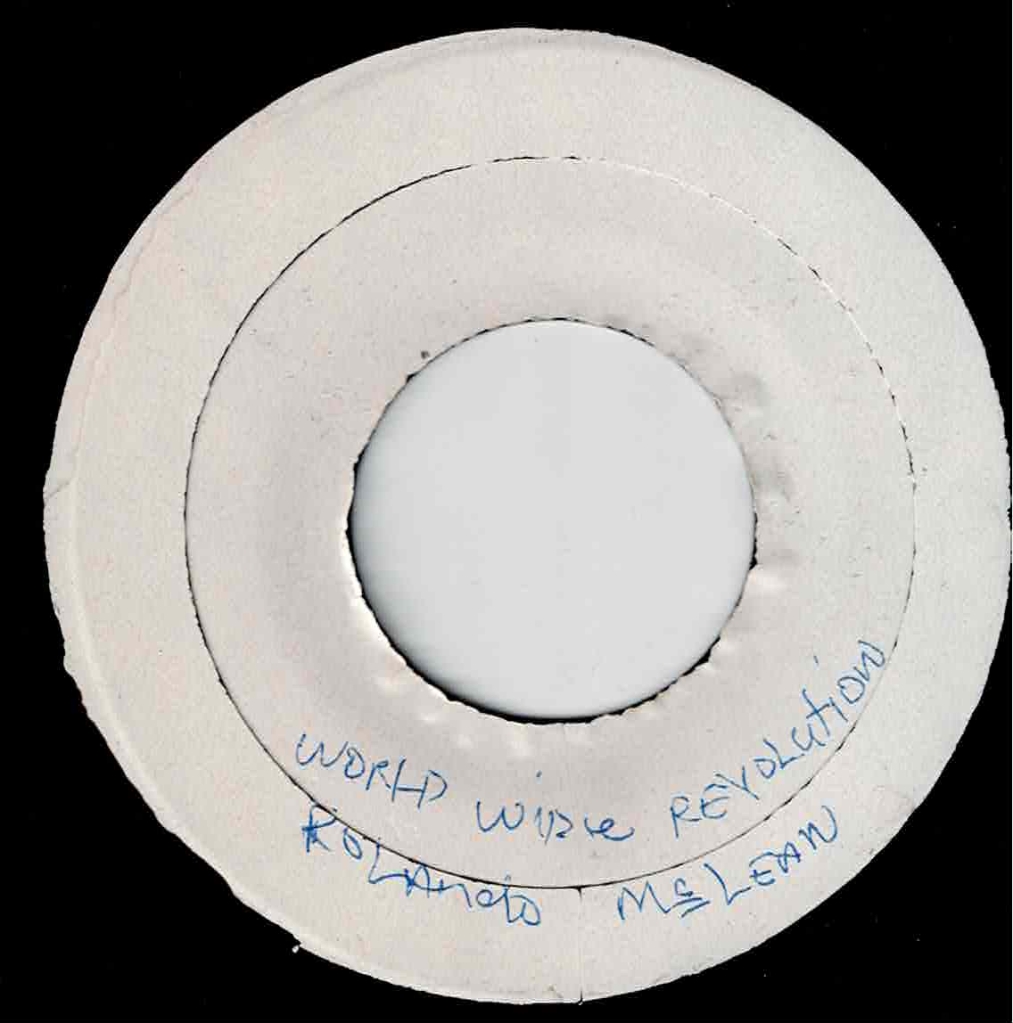
“World Wide Revolution” by Rolando McLean is on a Jamaican blank label record, with only the title and artist hand-written on it. “Version,” the side we play in The GO, is all that is written on the flip side. Roland McLean is the real name of Yami Bolo. The A-side appeared on Yami Bolo’s Put Down the Weapons LP from 1997. There seems to be no evidence of the single ever having been released, thus, the “version” played on The GO may be an exclusive!
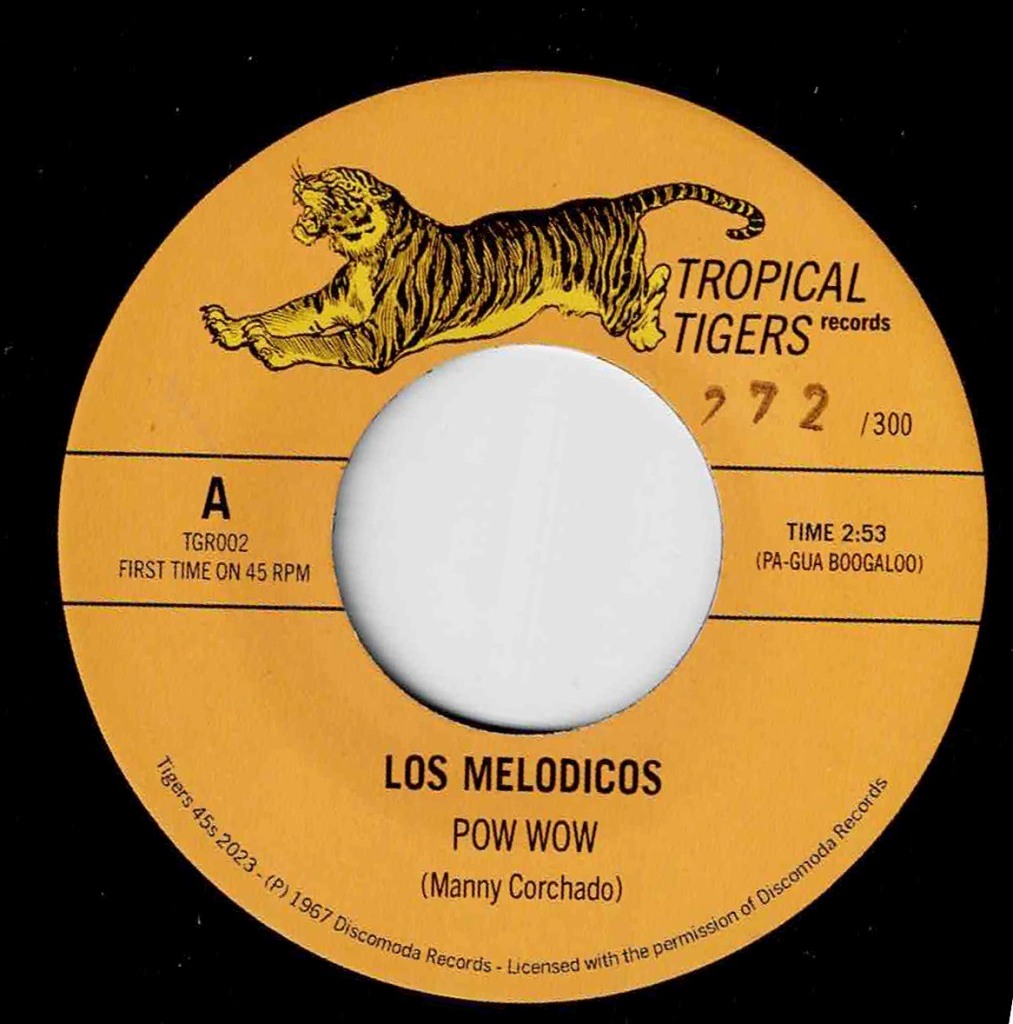
Tropical Tigers is a contemporary Italian record company that has been issuing fantastic Latin Boogaloo songs on 45 RPM. Only a limited amount of these records are pressed and often they are numbered. Most of the recordings come from Central or South America. The record heard in GO Number Twenty is “Pow Wow” by Los Melódicos, a group from Venezuela. It is a cover of a fantastic record by Manny Corchado. The version by Los Melódicos was only ever released as an LP track and this marks its first appearance on the seven-inch format—thus making it an ideal record for DJs who work only with 45 RPM records.
During the early nineties, The GO Mechanism producers were employed to catalog several hundred reel-to-reel audio tapes at a major music publishing company. This was an excellent job for him, as he was able to identify most of the recordings, thus making the end results fairly accurate. Every once in a while a song that seemed interesting was transferred onto a cassette tape for further inspection. One such recording is “Where Does It Lead.” A song with that title is listed in the publishing company’s database noting that it was written by Al Kooper and Irwin Levine. This makes sense as several other Al Kooper and/or Irwin Levine songs were included on some of the tapes. The GO Mechanism producers met Al Kooper once (backstage at Madison Square Garden when Dave Alvin opened for Bob Dylan) and asked him about the song. Kooper said that he remembered the song and that it was written as a follow-up to “This Diamond Ring,” the Gary Lewis & the Playboys hit that Kooper had co-written. He did not remember if it was ever released by anyone. Thus, it is quite possible that “Where Does It Lead” is a GO Mechanism exclusive!
GO Mechanism Number Twenty concludes with one of the greatest records of all time: “Block Buster” by Boots Brown and His Blockbusters. The GO Mechanism producers discovered this record when hanging out with Jeffrey Lee Pierce around 1978. They were scouring thrift stores in South Central Los Angeles searching for groovy records, and a 78 RPM copy of “Block Buster” was obtained by Mr. Pierce. They took it—and other finds—back to Phast Phreddie’s Hollywood pad and played it. The excitement the record generated had them jumping around the living room. They thought it was one of the greatest honking rhythm & blues records of all time, with its wild beat and wailing saxophones; much like the records of Big Jay McNeely or Joe Houston.
In 1986 the truth of this record came out. Eight tracks by Boots Brown and His Blockbusters (including “Block Buster”) were used to fill out a Little Richard reissue album in Europe. In the liner notes it stated that The Blockbusters was actually a group of West Coast cool jazz musicians led by the trumpet player Shorty Rogers. These were cats who had worked in the big bands of Woody Herman and Stan Kenton and, at the time, were based in Southern California: Bud Shank, Jimmy Giuffre, Shelly Manne, Dave Pell, etc. The music they made under their own names was much more restrained—some of it has been referred to as chamber jazz. But here they were, in 1952, rockin’! One could even consider this record as an early example of white people playing rock’n’roll—perhaps predating attempts by Bill Haley & His Comets, and certainly more rockin’.
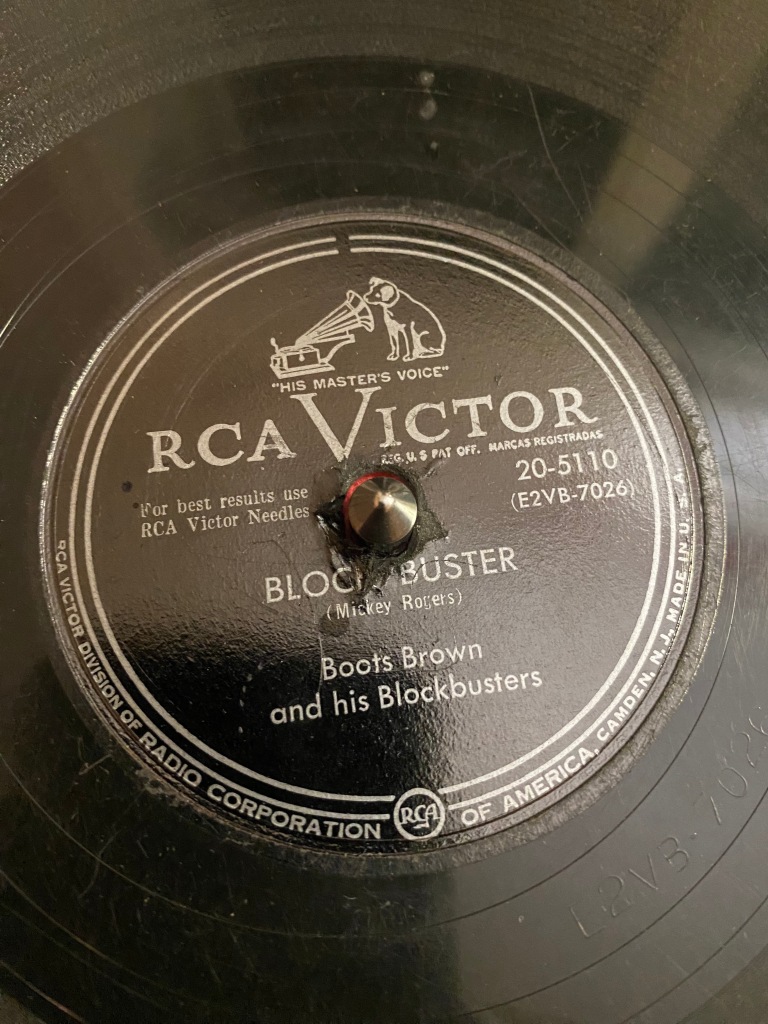
In the mid-eighties, Jeffrey moved to London. Before he did, he gave the Boots Brown 78 to Phast Phreddie (although now it had a crack!). It is pictured above.
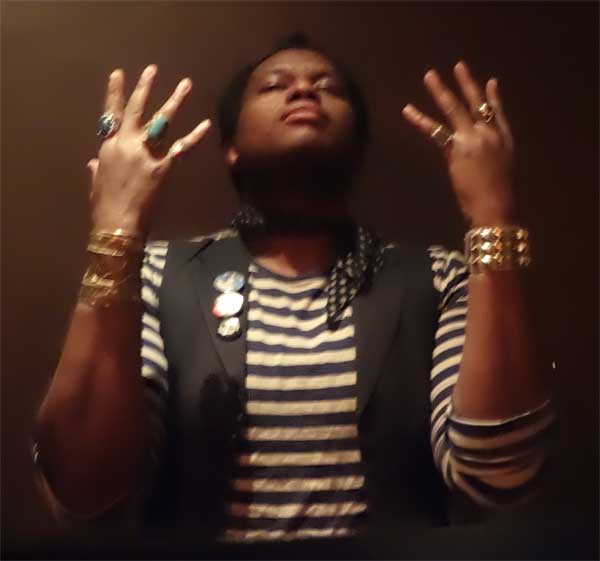
At various critical moments during the program, resident narrator Oweinama Biu recites several adages and sayings attributed to the guitarist Jimi Hendrix. Alec Guinness recited a poem by e.e. cummings entitled “The moon looked into my window” with music by Chip Kinman from his album of electronic music called The Great Confrontation.
The graphic image employed to illustrate this edition of The GO Mechanism is a collage by the great soul and reggae DJ Yana Lil’ Jerk. Most of her collages are assembled to provide visual excitement to the posters announcing her DJ nights, such as Bangarang and Living for Kicks. Some of her spectacular collages can be seen on her instagram site.
The GO Mechanism is produced whenever we feel like it and it initially airs on the Luxuria Music interweb streaming hustle as a Saturday Night Special. The GO Mechanism producers sincerely thank the powers-that-be at Luxuria Music for continuing to invite The GO back again and again. Luxuria Music is a very independent entity that can use some monetary love. Please go to Luxuria Music and buy something from its store. Also, while you are there, check out the other fantastic programs it has to offer.

Legacy GO Mechanisms can be found on the Mixclouds and here in the Boogaloo Bag. After a while, the audio portion of this GO Mechanism will magically appear below…
Here is a complete track listing for GO Mechanism Number Twenty:
- Earl Bostic—Lester Leaps In (King) (GO Mechanism opening theme)
- Eddie Davis—Hollerin’ and Screamin’ (Savoy)
- Mothers of Invention—Uncle Meat: Main Title Theme (Bizarre)
- Manuel “Loco” Valdez y Conjunto Louis Gonzalez Perez—El Blob (La Burbuja) (RCA Victor; Mexico)
- The Strawberry Alarm Clock—The World’s on Fire (exclusive Boogaloo edit) (from LP Incense and Peppermints; Uni)
- Billy Eckstine—Vertigo (Mercury)
- Rene Touzet—Totiri Mondachi (from LP Touzet—Too Much!; GNP)
- Timmy Thomas—It’s My Life (Goldwax)
- Johnny Nash—I’m Movin’ On (Warner Bros.)
- Temptations—I Can’t Get Next to You (backing track) (Gordy)
- The Flintstones—Safari (His Master’s Voice; UK)
- Sandy Nelson—I Feel Free (from LP Rebirth of the Beat; Imperial)
- The Dixie Cups—Iko Iko – a capella (from album Very Best of the Dixie Cups – Chapel of Love; Collectables)
- Olatunji and His Drums of Passion—Eyo-Sese (from LP High Life; Columbia)
- Terry & the Bunnys—Flying Guitar (King; Japan)
- The Marvelettes—Barefootin’ (from LP Sophisticated Soul; Tamla)
- The Happy Cats—These Boots Are Made for Walking (Omack)
- Little Anthony & the Imperials—Limbo Part II (End)
- Ken Boothe—Just Another Girl (Studio One; Jamaica)
- Aki Aleon and the Nobles—Body Surf (Festival; Australia)
- Bill Doggett—Caravan (from LP Bill Doggett Plays American Songs Bossa Nova Style; King)
- Sharon Jones & the Dap Kings—When I Come Home (Daptone)
- Steve Wynn—Smash Myself to Bits (from album Here Come the Miracles; Blue Rose)
- Barbara Lynn—This Is the Thanks I Get (Atlantic)
- Barbara Lynn—You’re Losing Me (Atlantic)
- Barbara Lynn—Until Then I’ll Suffer (Atlantic)
- Freddy King—Side Tracked (Federal)
- Middle East Ensemble conducted by Hakki Obadia and Joseph Sugar—Harem Dance (from LP 10 Nights in a Harem; M-G-M)
- Pigmeat Markham—Roberta (Wig)
- Rolando McLean—Worldwide Revolution version (blank label; Jamaica)
- Royal Sitars—Distant and Vague (Agitated; UK)
- production music—Insects (Robert Hall Productions)
- Chico Hamilton Quintet featuring Eric Dolphy—Opening (SESAC Repertory Recording)
- Bobby Porter—I’ve Been Working (Roulette)
- Los Melodicos—Pow Wow (Tropical Tiger; Italy)
- Ornette Coleman—Free Jazz (from LP Free Jazz; Atlantic)
- Dizzy Gillespie—Soul Kiss Part II (Perception)
- Los Teen Agers—Suena la Timba (from LP Cumbias y Gaitas Famosas; Discos Fuentes; Colombia)
- unknown group—Where Does It Lead (perhaps unreleased)
- Chip Kinman—Let’s Go Dark Shark (from album The Great Confrontation; In The Red)
- —Alec Guinness—the moon looked into my window (poem by e.e. cummings; from LP A Personal Choice; RCA Victor)
- Son Rompe Pera—Salerosa (from album Batuco; Aya; Argentina)
- Curtis Mayfield—Freddie’s Dead (Go Edit) (Curtom) (GO Mechanism closing theme
- Boots Brown & His Blockbusters—Blockbuster (RCA Victor)
